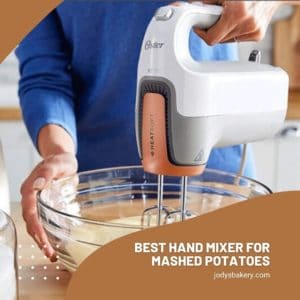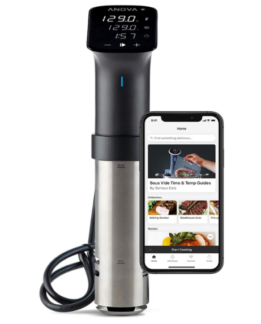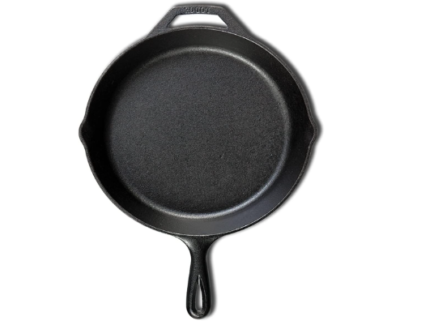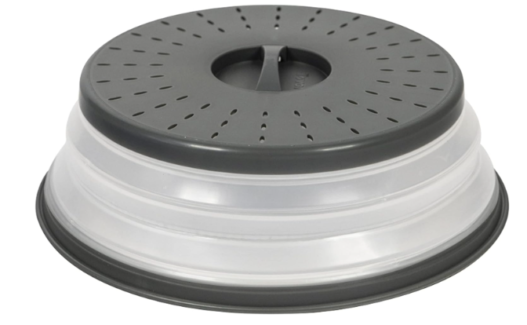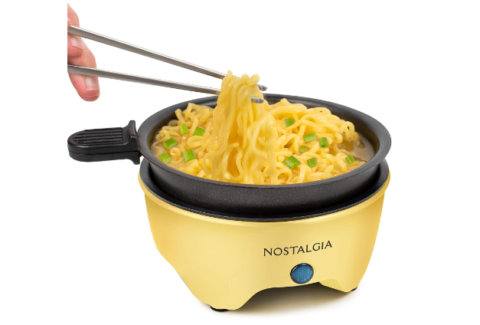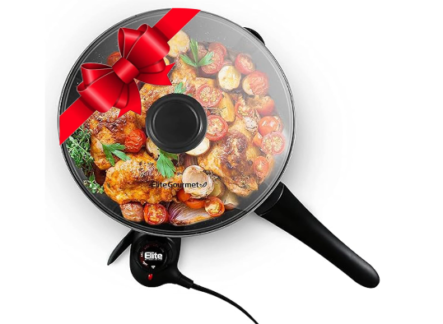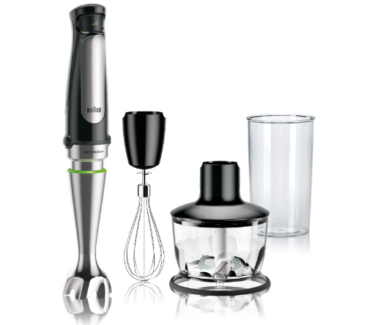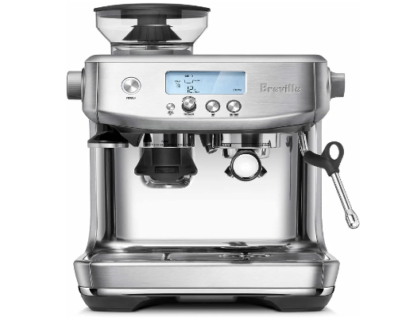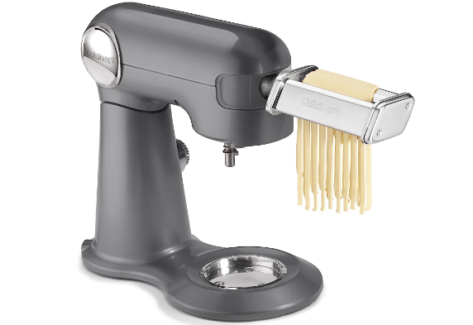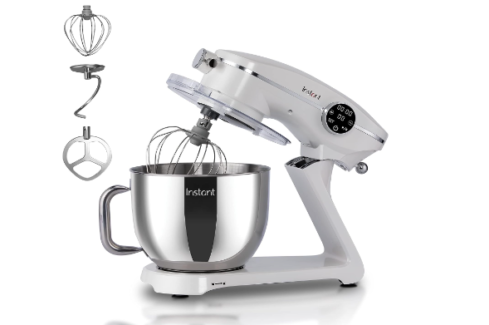Americans love their whipped cream. Whether it is on a...
Read More
A hand mixer is a small kitchen appliance that is used for blending, mixing, and whipping ingredients. It is a handheld device that can be used to create everything from whipped cream to meringue.
Meringue is a delicate mixture of whipped egg whites and sugar that can be used in a variety of desserts, including pies, tarts, and cookies. Making meringue can be a challenging task, but with the help of a hand mixer, it can be much easier to achieve the desired texture and consistency.
A hand mixer for meringue typically features multiple speed settings and various attachments, including a whisk attachment that is specifically designed for whipping egg whites. Some models also feature a slow start option to prevent splattering and a turbo boost function for extra power when needed.
When making meringue with a hand mixer, it’s important to use a clean, dry mixing bowl and ensure that the egg whites are at room temperature. The mixer should be set to a low speed initially and gradually increased to a higher speed until stiff peaks form. With a little practice and the right equipment, anyone can make perfectly whipped meringue using a hand mixer.
Can you whip meringue with a hand mixer?
Yes, you can definitely whip meringue with a hand mixer. A hand mixer is a great tool for whipping meringue as it provides the speed and power needed to create stiff peaks in the egg whites.
To whip meringue with a hand mixer, start by ensuring that the mixing bowl and whisk attachment are clean and dry. Then, separate the egg whites from the yolks and place the egg whites into the mixing bowl. Begin mixing the egg whites on low speed, gradually increasing the speed to medium-high as the egg whites start to become frothy. Slowly add in the sugar, a tablespoon at a time, while continuing to mix on medium-high speed.
Once all the sugar has been added, increase the speed to high and continue mixing until stiff peaks form. This can take anywhere from 3 to 10 minutes, depending on the power of your hand mixer and the amount of egg whites you are using.
It’s important to note that making meringue can be a bit finicky and is influenced by many factors such as the freshness of the eggs, the temperature of the eggs, and the humidity in the air. However, with a little practice and patience, you can definitely whip meringue with a hand mixer.
Which hand mixer attachment for meringue?
The best attachment to use for making meringue with a hand mixer is the whisk attachment. The whisk attachment is specifically designed for whipping egg whites and can help create the volume and stiffness needed for meringue.
The whisk attachment typically has thin wires that are arranged in a circular pattern to maximize contact with the ingredients and create more air pockets. When using the whisk attachment for making meringue, it’s important to ensure that the attachment is securely attached to the mixer and that the bowl and attachment are clean and dry.
In addition to the whisk attachment, some hand mixer models come with other attachments such as beaters or dough hooks. While these attachments can be useful for other recipes, they are not ideal for making meringue as they do not create the same amount of air as the whisk attachment.
Is a stand mixer better than a hand mixer for meringue?
A stand mixer can be better than a hand mixer for making meringue as it allows for hands-free mixing and can provide more power and stability.
Stand mixers are generally more powerful than hand mixers and have larger and more powerful motors, which can handle larger volumes of ingredients and can mix them more thoroughly. Additionally, stand mixers are designed to remain stable on a countertop, which means they can continue to mix without being held by the user. This allows for a more consistent mixing and helps to create a stable meringue.
However, it’s important to note that stand mixers can be quite expensive and take up a lot of counter space, which may not be practical for everyone. Hand mixers are more affordable and compact, making them a good choice for those with limited space or a smaller budget.
Ultimately, both stand mixers and hand mixers can be used to make meringue successfully. The choice between them depends on personal preference, budget, and the amount of meringue you plan to make.
What hand mixer speed for meringue?
When making meringue with a hand mixer, it’s important to start at a low speed and gradually increase the speed as the meringue starts to thicken.
Begin by using the hand mixer on the lowest speed to beat the egg whites until they become frothy. Then, gradually increase the speed to medium-high and continue beating until the egg whites form soft peaks. Finally, increase the speed to high and continue beating until the meringue forms stiff peaks and is glossy in appearance.
In general, it’s recommended to use the highest speed setting on the hand mixer for the final stage of beating the meringue to achieve the desired consistency. However, it’s important to monitor the meringue closely and adjust the speed as needed to prevent overmixing or curdling.
How many watts is a good hand mixer for meringue?
A good hand mixer for making meringue should have a motor power of at least 250 watts. This will provide enough power to efficiently whip the egg whites and create a fluffy meringue with the desired texture.
However, it’s important to note that the motor power is not the only factor to consider when choosing a hand mixer for making meringue. Other factors to consider include the speed settings, the durability of the mixer, and the attachments that come with the mixer.
In addition, keep in mind that if you plan to make meringue on a regular basis or in large quantities, it may be worth investing in a more powerful stand mixer rather than relying solely on a hand mixer.
Benefits of using hand mixer for meringue
Using a hand mixer for making meringue offers several benefits, including:
- Convenience: A hand mixer is lightweight and portable, making it easy to move around your kitchen and use wherever you need it. It’s also smaller than a stand mixer, so it takes up less counter space and is easier to store.
- Speed: Hand mixers typically have several speed settings, allowing you to adjust the speed to the specific task you’re performing. This can be particularly helpful when making meringue, as you’ll want to start with a lower speed and gradually increase it as the mixture becomes thicker.
- Control: With a hand mixer, you have more control over the mixing process than you would with a stand mixer. This can be especially important when making meringue, as you want to avoid overmixing the mixture, which can cause it to become grainy or lose volume.
- Easy to clean: Hand mixers are generally easier to clean than stand mixers, as they have fewer parts and are more compact. This can be a real time-saver when you’re busy in the kitchen.
- Lower cost: Hand mixers are typically less expensive than stand mixers, making them a good option for those on a budget or who don’t want to invest in a larger, more expensive appliance.
Factors to consider when choosing the best hand mixer for meringue
When choosing the best hand mixer for making meringue, consider the following factors:
- Power: Look for a hand mixer with a powerful motor, ideally one with at least 250 watts. This will allow the mixer to handle the thick and heavy meringue mixture.
- Speed settings: Look for a hand mixer with multiple speed settings so you can adjust the speed to the specific task you’re performing. For making meringue, it’s important to start with a lower speed and gradually increase it as the mixture thickens.
- Weight: Choose a hand mixer that feels comfortable in your hand and is not too heavy. You’ll be holding the mixer for an extended period of time, so you don’t want it to be too heavy and cause hand fatigue.
- Accessories: Look for a hand mixer that comes with accessories such as a whisk, beaters, and dough hooks. Having these attachments will allow you to use the hand mixer for a variety of tasks in addition to making meringue.
- Cord length: Consider the length of the cord, especially if you have limited counter space. A longer cord will give you more flexibility and allow you to use the mixer in different locations in your kitchen.
- Durability: Look for a hand mixer that is made of durable materials and has a sturdy construction. You want a mixer that will last for a long time and can handle repeated use.
- Price: Consider your budget and choose a hand mixer that fits within it. Hand mixers are generally less expensive than stand mixers, but you can still find a high-quality hand mixer at a reasonable price.
What is the best hand mixer for making meringue?
There are many great hand mixers available on the market that are well-suited for making meringue. Some of the best options include:
- KitchenAid 9-Speed Digital Hand Mixer: This hand mixer has a powerful motor, nine speed settings, and comes with stainless steel beaters, a whisk, and dough hooks. It also features a soft-grip handle for comfortable use.
- Cuisinart Power Advantage Plus 9-Speed Hand Mixer: This mixer has a powerful 220-watt motor, nine speed settings, and comes with beaters, a chef’s whisk, dough hooks, and a spatula. It also has a smooth start feature to prevent splattering.
- Breville Handy Mix Scraper Hand Mixer: This mixer features a powerful 240-watt motor, nine speed settings, and comes with a whisk, dough hooks, and a scraper beater. The scraper beater is designed to scrape the sides of the bowl while mixing for more efficient mixing.
- Black+Decker Helix Performance Premium Hand Mixer: This mixer has a powerful motor, five speed settings, and comes with helix beaters and a wire whisk. The helix beaters are designed to provide more thorough mixing and incorporate more air into the mixture for fluffier meringue.
Ultimately, the best hand mixer for making meringue will depend on your specific needs and preferences. Be sure to consider factors such as motor power, speed settings, and included attachments when making your selection.
How to use hand mixer for meringue
Here are the steps to use a hand mixer for making meringue:
- Prepare your ingredients. Make sure the eggs are at room temperature, and measure out your sugar and any other flavorings you want to add.
- Attach the whisk attachment to your hand mixer.
- Add the egg whites to a clean, dry mixing bowl.
- Start beating the egg whites on low speed until they start to become frothy.
- Gradually increase the speed to medium-high and start adding the sugar, one tablespoon at a time, while continuing to beat the mixture.
- Once all the sugar has been added, increase the speed to high and continue beating until stiff peaks form. This means the mixture is glossy, stiff, and can hold its shape when the whisk is lifted.
- If desired, add any flavorings or colors and gently fold them into the meringue mixture.
- Use the meringue immediately, or transfer it to a piping bag or container and store it in the fridge until ready to use.
Note: It is important to use a clean, dry mixing bowl and beaters when making meringue. Any traces of grease or moisture can prevent the egg whites from whipping up properly.
How many minutes does it take to whisk meringue?
The time it takes to whisk meringue depends on several factors such as the amount of egg whites, the speed of your mixer, and the type of meringue you are making. Generally, it can take anywhere from 5-15 minutes to whisk meringue until it reaches the desired consistency, which is typically a stiff peak. It’s important to keep an eye on the meringue and stop mixing once it reaches the desired consistency to avoid over-whipping.
How do you know when to stop mixing meringue?
You can tell when to stop mixing meringue by checking its consistency. When the egg whites and sugar have been whipped to the right point, the meringue should have a glossy and stiff peak.
To test the peak, lift the beaters out of the mixture, and if the meringue forms a peak that stands upright and doesn’t flop over, then it’s ready. You can also turn the bowl upside down, and if the meringue doesn’t slide out, then it’s ready. However, it’s important not to over-mix the meringue as this can cause it to become dry and grainy.
What happens if you whip meringue too long?
If you whip meringue for too long, it can become over-whipped and the protein structure can break down. This results in a grainy and watery mixture, and it won’t be able to hold its shape when piped or spooned. It is important to stop whipping when the meringue reaches stiff peaks, which means the mixture is glossy, stiff, and can hold its shape when the whisk is lifted.
What are the common mistakes to avoid while preparing meringue?
Here are some common mistakes to avoid while preparing meringue:
- Using a dirty or greasy mixing bowl: Any traces of grease or moisture can prevent the egg whites from whipping up properly. Make sure the mixing bowl and beaters are clean and dry before starting.
- Not separating the egg whites properly: Make sure to separate the egg whites from the yolks carefully, and don’t get any yolk into the whites. Even a small amount of yolk can prevent the whites from whipping up properly.
- Using cold egg whites: Meringue whips up better at room temperature, so make sure the egg whites are at room temperature before starting.
- Adding sugar too quickly: When adding sugar to the egg whites, make sure to add it gradually, one tablespoon at a time, while beating continuously. Adding it too quickly can cause the mixture to deflate.
- Overbeating the mixture: Overbeating the meringue can cause it to become dry and clumpy. Stop beating as soon as stiff peaks form.
- Adding ingredients at the wrong time: If you’re adding any flavorings or colors to the meringue, make sure to add them after the stiff peaks have formed. Adding them too early can prevent the meringue from whipping up properly.
By avoiding these common mistakes, you can increase your chances of making a successful meringue.
What is the secret to making good meringue?
The secret to making good meringue is to ensure that the egg whites are at room temperature, free of any traces of yolks or fats, and that the mixing bowl and beaters are completely clean and dry. Gradually adding the sugar and beating the egg whites until they form stiff, glossy peaks is also key to achieving a perfect meringue. Additionally, it’s important to avoid over-whipping the meringue as this can cause it to become dry and grainy.
Should eggs be cold or room temp for meringue?
It is generally recommended to use eggs at room temperature for making meringue. Room temperature egg whites will whip up to a greater volume and more quickly than cold egg whites. This is because room temperature egg whites have lower surface tension and are more elastic, allowing air to be more easily incorporated into the mixture as it is whipped. You can let your eggs sit at room temperature for about 30 minutes before using them, or you can place them in a bowl of warm water for a few minutes to bring them up to temperature more quickly.
Can you make a meringue without an electric mixer?
Yes, it is possible to make meringue without an electric mixer. However, it will require a lot of effort and time to achieve the desired consistency compared to using an electric mixer. Here’s how you can make meringue without an electric mixer:
- Start with room temperature egg whites in a clean, dry mixing bowl.
- Using a wire whisk, whisk the egg whites until they become frothy.
- Add a small amount of sugar to the egg whites, and continue whisking until the sugar dissolves.
- Gradually add the rest of the sugar, one tablespoon at a time, while continuing to whisk the egg whites.
- Keep whisking the mixture until it forms stiff peaks and has a glossy texture.
It’s important to note that making meringue by hand can take up to 10-15 minutes of whisking, and requires a lot of arm strength and patience.
Can I use paddle attachment instead of whisk for meringue?
It is not recommended to use a paddle attachment instead of a whisk attachment for making meringue. The paddle attachment is designed to mix ingredients together rather than aerate them, which is essential for making a light and fluffy meringue. Using a paddle attachment could result in a dense and heavy meringue that lacks the desired texture. It’s best to use a whisk attachment or a hand whisk to make meringue.
Conclusion
In conclusion, a hand mixer is a great tool for making meringue, especially for small batches. When choosing a hand mixer for meringue, it’s important to consider factors such as the motor power, speed settings, and attachments available.
It’s also important to follow the recipe carefully and avoid common mistakes like adding sugar too quickly or overbeating the meringue. With the right technique and equipment, you can achieve perfectly whipped meringue every time.
Related Posts
Best Hand Mixer For Mashed Potatoes
Mashed potatoes are a classic Thanksgiving side dish. This year,...
Read MoreWhy Trust Us
You will find what you are looking for at Jody's Bakery. From classic to luxury brands, you'll find both. We will help you to select appliances that fit your needs, budget and lifestyle. Whether you want to stop by to learn more — or plan to make a major purchase — we’ll treat you like family and assist you every step of the way. Shop with us today to receive friendly and experienced help along the way.











